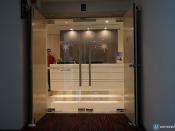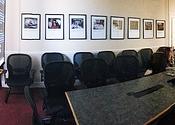In an increasing number of companies, traditional office space is giving way to community areas and empty chairs as employees work from home, from their cars or from virtually anywhere. Advanced technologies and progressive HR strategies make these alternative offices possible.
Imagine it's 2 o'clock on a Wednesday afternoon. Inside the dining room of many nationwide offices, Joe Smith, manager of HR, is downing a sandwich and soda while wading through phone and E-mail messages. In front of him is a computer--equipped with a fax-modem--is plugged into a special port on the dining table. The contents of his briefcase are spread on the table. As he sifts through a stack of paperwork and types responses into the computer, he periodically picks up a cordless phone and places a call to a colleague or associate. As he talks, he sometimes wanders across the room.
To be sure, this isn't your ordinary corporate environment.
Smith doesn't have a permanent desk or workspace, nor his own telephone. When he enters the ad agency's building, he checks out a portable Macintosh computer and a cordless phone and heads off to whatever nook or cranny he chooses. It might be the company library, or a common area under a bright window. It could even be the dining room or Student Union, which houses punching bags, televisions and a pool table. Wherever he goes, a network forwards mail and phone pages to him and a computer routes calls, faxes and E-mail messages to his assigned extension. He simply logs onto the firm's computer system and accesses his security-protected files.
He is not tethered to a specific work area nor forced to function in any predefined way. Joe Smith spends mornings, and even sometimes an entire day, connected from home via sophisticated voicemail and E-mail systems,



Good Essay
i used this for my summer internship, and it worked like a dream
5 out of 6 people found this comment useful.